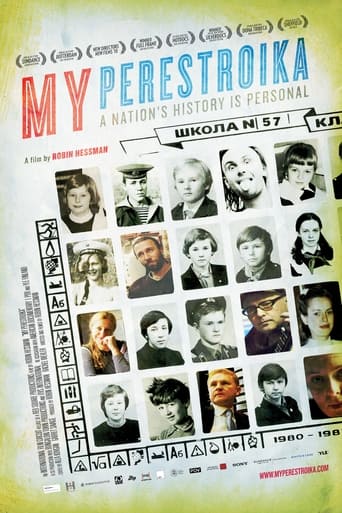Joseph Waters
This propaganda brought to you by the big three corporate charities: Ford, Hewlitt and MacArthur Foundations. All three can easily be suspected of being CIA fronts, but there is solid evidence that the Ford Foundation has served as a front and a means of funneling money from the CIA to fund psychological warfare to sell the American brand to the world as well as to demonize socialism, communism and third-world liberation movements. They promote pro-capitalist and pro-bourgeois "values." One of the individuals followed in the documentary, a teacher, refers to Lenin as "basically a cannibal" and all of the interviewees are really down on their country - both as the Soviet Union and Russia today. At least 4 out of the 5 individuals express explicitly anti-Putin views; not a good sample of the Russian population given that Mr. Putin's approval rating in Russia is something like 87% as of this writing.The documentary even tries to whitewash the abominable actions of Gorbachev and Yeltsin, the first a naive idiot and the second a scoundrel and a criminal who privatized everything in sight, usurped power in the name of "democracy" and destroyed the country. On the other hand, Putin is hated by the U.S. today because he has made Russia a great power again.As an American citizen, I watched this hoping to see some old footage of Soviet times and maybe hear at least one favorable account of life in the USSR, but I was to be very disappointed. I have read other accounts of people who grew up under communism and while some heap criticism on it, others remember the good outweighing the bad. They say that although the communist party leadership kept a firm hold over the society, things like the absence of crime, guaranteed housing, free healthcare and education and even subsidized transportation and cultural activities were not something to just scoff at.
MartinHafer
For the last couple decades, the US has had very, very little interest in Russia. It seems that after the Cold War technically ended, most Americans just wanted to assume everything was fine and go on with our lives. However, while the old regimes are gone, in its place is a lot of uncertainty--and this documentary does a great job of discussing the historical context for the new Russia as well as the vague dissatisfaction many there feel today. It's all enlightening--even if there are no clear answers. The film consists of the filmmakers following several 40-something Russians and just letting them talk. You have no narration--it's just like the folks are talking to you. Much of the film is a discussion of the old Soviet Union and its fall. I liked how the filmmakers juxtaposed this footage with old propaganda film from the Soviet government--it did a good job illustrating the old regime. The rest of the film concerned present-day Russia which is NOT such a clear picture. While the participants generally felt things are better, they were VERY jaded and seemed to have no faith in the current Putin government. However, how they react to this and the new sense of capitalism varies and is quite interesting to see--such as the idealistic man who has sort of dropped out of society. An interesting historical portrait of the old and a confusing view of the future--which is probably indicative of the average Russian's view of life in their country. It was the most telling when one said "What has really changed?". Fascinating and well made.
Emmett Pepper
Combining vintage footage with modern interviews gives an informative glimpse into the everyday life of children in the Soviet Union and how different things are today for both the children and the adults. The interviews with the now-adults about their childhood were, in my opinion the most enlightening and interesting, as well as the portions about what it was actually like going through perestroika and glasnost. I thought it could have had a stronger theme tying the people together, but it may have just been a product of what the premise of the film was. Anyone interested in what Communism was actually like should definitely watch this.
Sin Young Kim
It's a unique story related with a particular period of political upheaval, and at the same time it's a general story about a nostalgia that all of us sympathize with. It's a Nostalgia for the days that we didn't have to worry about severe competitions, untrustworthy policies, unfair present and ambiguous future. It was the time we could find a peace of mind from the passivity and obedience. We were not ready enough to deal well with an unexpected freedom. We're also not ready to accept numerous choices and the results that we're responsible for. We don't even know how to explain clearly, if someone asked us why that time was better to us. We just know it was better. We're still not sure about the present. However, sometimes we found ourselves surprisingly living well in the present without any distinct understanding about it.


 AD
AD

